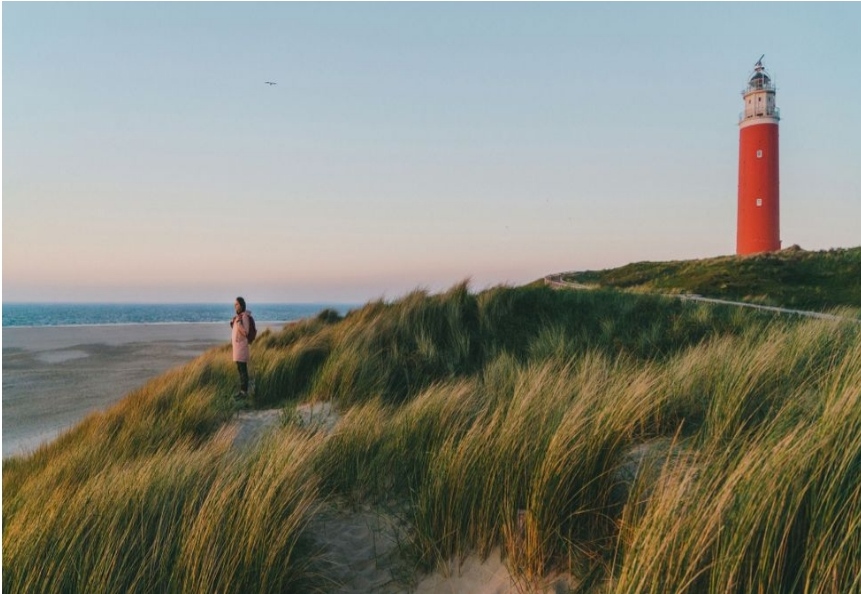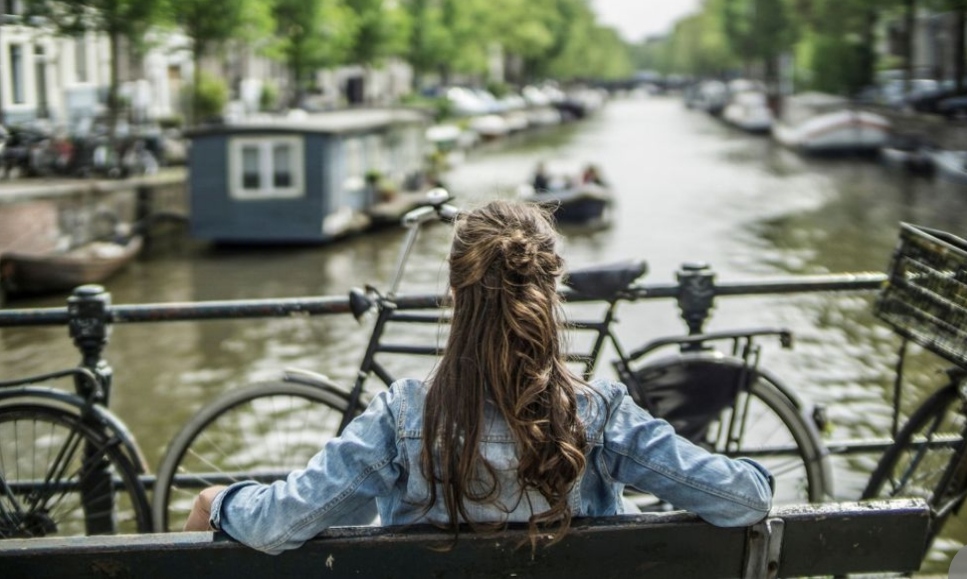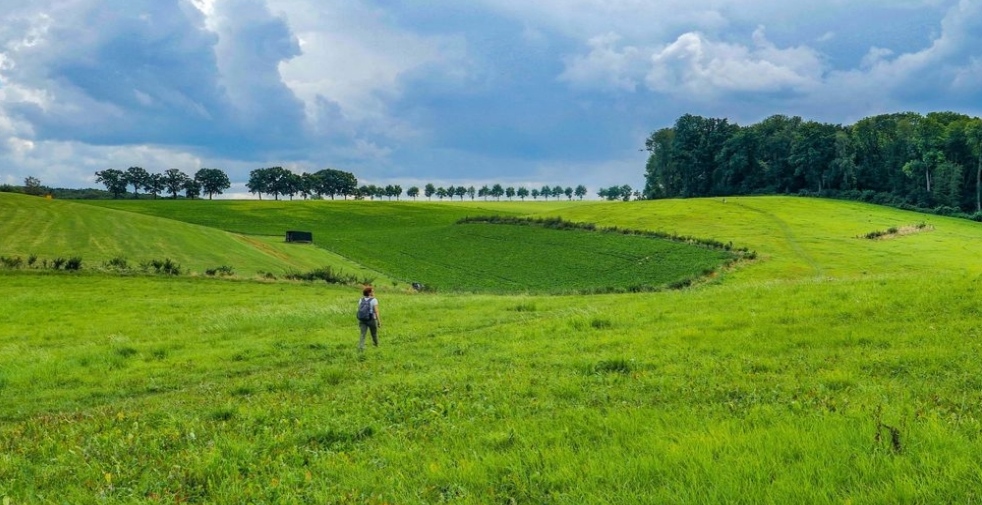The Dutch solution to busyness that captivated the world

Niksen – a Dutch wellness trend that means “doing nothing” – has caught the attention of the world as a way to manage stress or recover from burnout.
By
Olga Mecking
The Hague, where I live, has 11km of gorgeous coastline with rolling dunes and sandy beaches. In summer, I often see locals in Scheveningen or Kijkduin (the city’s most famous beaches) sunbathing, strolling in nature or riding their bikes, then sitting down on one of the many benches available. Sometimes, they’re reading or chatting with their friends, but just as often, they’re engaging in niksen.
Niksen is a Dutch wellness trend that means “doing nothing”. It first caught the attention of the world in 2019 as a way to manage stress or recover from burnout. At the time, many people were complaining about exhaustion and depression caused by overwork and were looking for solutions – which is why concepts such as Japanese ikigai or Danish hygge also entered the English lexicon. As a linguist myself, I loved the idea that you could express the whole concept of doing nothing in one short and easy-to-pronounce word.
In my book Niksen: Embracing the Dutch Art of Doing Nothing, I define it as “doing nothing without a purpose” – so not scrolling on Facebook or engaging in meditation. Whereas mindfulness is about being present in the moment, niksen is more about carving out time to just be, letting your mind wander wherever it wants to go. And as we’re slowly recovering after the pandemic, it’s important to rethink the way we work and spend our time.
Linguistically, niksen (doing nothing) is a verb created from “niks”, which means “nothing”.
“It fits with the tendency of the Dutch language to create verbs out of nouns. From from ‘voetbal’ (football) to voetballen (playing football), from ‘internet’ to internetten, from ‘whatsapp’ to whatsappen etc. I think this is something that happens in Dutch in particular,” said Monique Flecken, a psycholinguist at the University of Amsterdam, who researches how the languages we speak affect the way we see the world. Essentially, it’s much less work to say “niksen” instead of “to do nothing”. “The Dutch are a practical, direct people and their language reflects that,” she said.

Niksen is about carving out time to just be, letting your mind wander wherever it wants to go.
In the Netherlands, the word can be used in a variety of ways, both positive and negative. Flecken said: “A parent might say to their kid, “Zit je weer te niksen?” (Are you doing nothing again?). And I would also say ‘lekker niksen’, which translates to ‘delicious doing nothing’, when talking about an evening blissfully free of any tasks or work.”
To Thijs Launspach, a psychologist, TEDx speaker and author of the book Crazy Busy: Staying Sane in a Stressful World, niksen means “doing nothing or occupying yourself with something trivial as a way of enjoying your own time. Not doing nothing entirely but doing as little as possible,” he said, pointing out that this mostly applies to elderly people who have more unstructured free time. Younger generations, on the other hand, are more stressed out than ever – even in the Netherlands, a country traditionally applauded for its work-life balance.
It’s not necessarily bad to be for a moment in a state of stress, where you’re really on and focused. The problem is when this is getting out of hand
There are plenty of reasons for that. “Our lives and our jobs have become increasingly complex. We tend to spend a lot of time with computers. There is a lot of pressure on being the best version of yourself, be it in our jobs, or the expectations of parents [or] from social media. There is a lot of pressure to perform,” Launspach said.
Of course, some stress can be good, as Leiden University psychology professor Bernet Elzinga points out. “It’s not necessarily bad to be for a moment in a state of stress, where you’re really on and focused. The problem is when this is getting out of hand,” she said.
Of course, some stress can be good, as Leiden University psychology professor Bernet Elzinga points out. “It’s not necessarily bad to be for a moment in a state of stress, where you’re really on and focused. The problem is when this is getting out of hand,” she said.But niksen can help with that. “When you do nothing, you connect to your default mode network. And that network is responsible for mind-wandering and reflection,” Elzinga explained.
Paradoxically, niksen can also make us more productive, simply because breaks allow our brains to rest and come back with better focus and sustained attention. This is probably why, while the Dutch don’t work long hours, they tend to be very efficient at work. Working overtime is not encouraged due to the “just be normal, that’s already crazy enough” attitude prevalent in the Netherlands – a nod towards the country’s honest and egalitarian culture.
NIKSEN-FRIENDLY PLACES IN THE NETHERLANDS
– Beaches are excellent places for niksen: In the Hague, head to Kijkduin or Scheveningen. Close to Amsterdam, there is Castricum and Zandvoort.
– Dunes: Near Rotterdam is Voornes Duin, an amazing dune area with hiking and cycling trails as well as many benches to sit down.
– Parks: In Rotterdam, the Kralingse Bos offers great opportunities for niksen.
– And it seems to work: the Dutch are a creative nation. Just think of all the famous painters like Rembrandt, Vermeer or Escher, as well as the innovative solutions the Dutch have found to battle the recurring threat of floods, such as huge dams and floating houses.
the Dutch have found to battle the recurring threat of floods, such as huge dams and floating houses.
The Dutch also like to enjoy life, as shown by the word lekker. This means “delicious” but can be used to refer to anything nice and pleasant, like lekker warm (deliciously warm), lekker slapen (sleeping deliciously), and, of course, lekker niksen, or “deliciously doing nothing”. This available architecture of leisure makes it more possible for people to do nothing more easily.
Locals like spending their time in active ways, such as cycling or hiking, allowing time for clearing the mind. And each time the sun comes out, the Dutch flock to cafes and terraces en masse, even in the winter. For me, these are perfect places for doing nothing.
However, Launspach is not a fan of doing nothing as a stress-preventing measure. “I’m a little bit sceptical of the idea that you should create a buffer between you and stress. I don’t know if that’s even possible in the way that we live and work now,” he said.

A large network of hiking and cycling routes criss-crosses the country, meaning it’s easy to get into nature.
Elzinga believes that it’s much better to do some sort of physical activity to distract you from your daily worries, preferably in nature. But luckily, in the Netherlands, there is a way to combine all these things – niksen, nature and movement.
While the country is not commonly known for its natural resources , the Dutch appreciate the little natural areas they have. Many dune areas – my favourite thing about The Netherlands – are a part of a large network of hiking and cycling routes crisscrossing the country. Even in large cities such as Rotterdam, The Hague or Amsterdam, you’re never too far away from a trail.
In a cooperation with the Dutch Railway system, Wandelnet – a foundation devoted to creating and maintaining hiking routes – has created NS Wandelingen, a system of hiking routes that are easy to reach by train or other public transport. They range between 7km and 22km in length, making them perfect for a day trip. And given the many benches along the way, it’s even possible to fit in a little niksen break.
This leisure time is possible for the Dutch because the Netherlands is a country with an excellent welfare system, and while people tend to work hard, they also take (and are granted) many days off.
“Having a good social support system, having lower stress level relates to feeling secure and in balance. So, I wouldn’t overestimate the importance of that,” said Elzinga.
And with everything going on in the world – the Covid-19 pandemic, the war in Ukraine – relieving stress is more important than ever.
Source : BBC Travel



